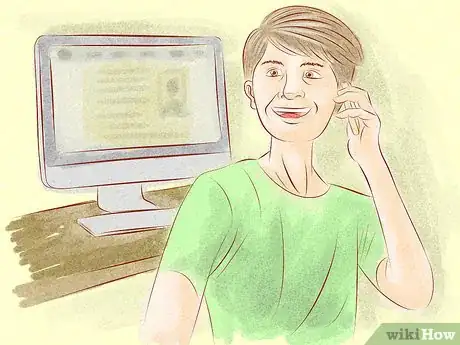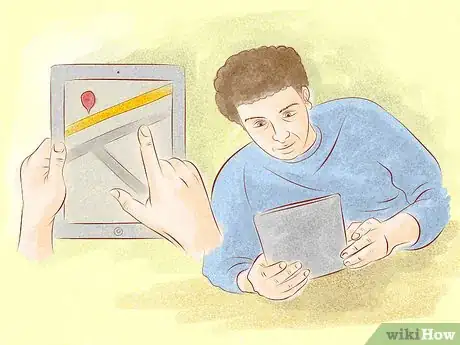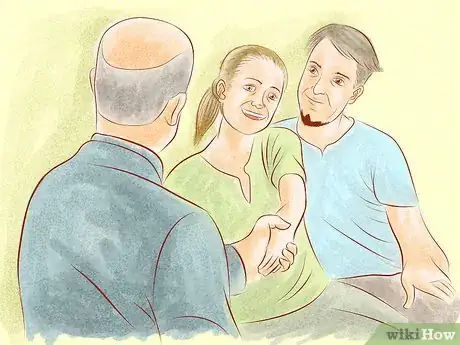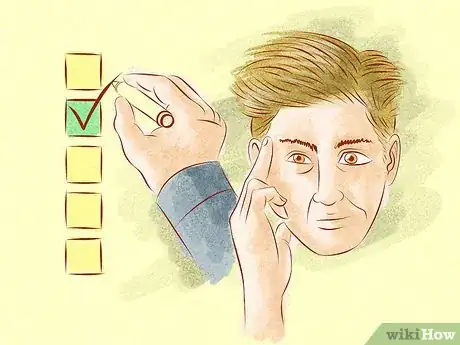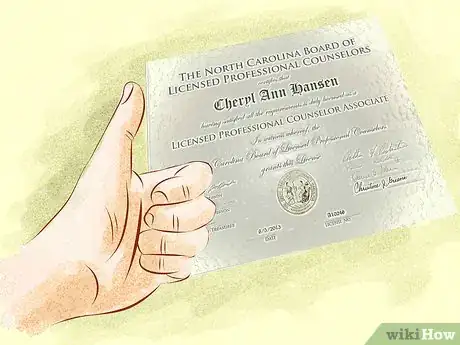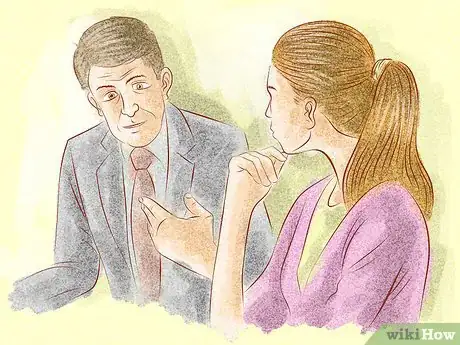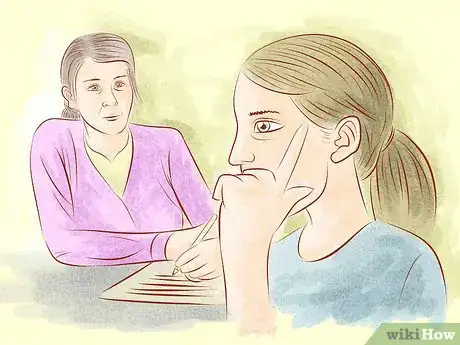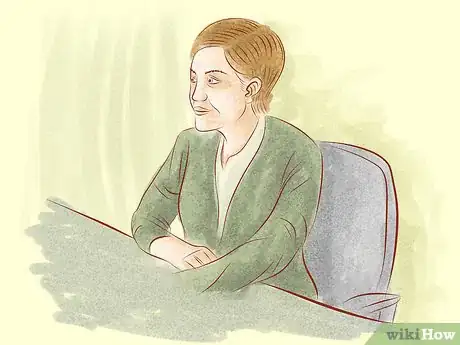This article was co-authored by Moshe Ratson, MFT, PCC. Moshe Ratson is the Executive Director of spiral2grow Marriage & Family Therapy, a coaching and therapy clinic in New York City. Moshe is an International Coach Federation accredited Professional Certified Coach (PCC). He received his MS in Marriage and Family Therapy from Iona College. Moshe is a clinical member of the American Association of Marriage and Family Therapy (AAMFT), and a member of the International Coach Federation (ICF).
This article has been viewed 39,535 times.
A marriage counselor (also called a couples therapist) works with one or both spouses to improve a marriage. The counselor typically focuses on conflict resolution, communication skills, and finding ways to improve the marriage overall.[1] Marriage counseling is usually a short-term span of psychotherapy, ideally giving the couple the necessary tools to work on their marriage outside of therapy. Your choice of a marriage counselor could mean the difference between a breakthrough reconciliation or a frustrating, stressful, and expensive dead end. Learning how to evaluate and choose a marriage counselor can help you and your partner down the road to recovery and reparation.
Steps
Locating Counselors Near You
-
1Search for marriage counselors. The first step in finding a marriage counselor is to see which counselors practice in your area. You can look up therapists in your local phone book, by searching online, or by using a reputable therapist database, such as Psychology Today's Find a Therapist page.[2]
- Online databases let you search by area, by specialty, and by accepted insurance plans.
- You can also ask your primary care physician for recommendations/referrals. If you trust your primary doctor, it's probably safe to trust their recommendations.
- If any trustworthy friends or family members have gone through marriage counseling, you might consider asking them for recommendations. You may however not wish to do this if you don't want others to know you're seeking counseling.
- A licensed marriage counselor will have the title Licensed Marriage and Family Therapist (LMFT) or similar depending where you are but you can speak to a counselor that is not an LMFT and has relevant experience.
- While a regular counselor or psychologist may have experience working with couples, it's important to find a therapist who has the specialized experience that you need. Ask the counselor about their training and credentials. Additionally, you should ask which area of couples therapy they specializes in, such as marriage counseling after infidelity or after the loss of a child.
-
2Look up the therapist's location. Once you've found some counselors in your area, you should look up where each counselor practices and how you would get there. Depending on where you live, commuting from one side of town to the other (or even the next town over) might be very difficult. You may also want to factor in modes of transportation. If you do not own a car and rely on public transit, check a transit map to see how close to each counselor you can get, as well as how long that commute would take.Advertisement
-
3Consider each counselor's availability. Some counselors work within the usual 9:00 to 5:00 workday hours, which could make it difficult to meet if you or your spouse work a job with rigid hours. Many counselors work on weekends or later in the day to accommodate working patients, although depending on your schedule that may be even less convenient.
- If you're signing up for marriage counseling, you want to ensure that you and your partner will be able to make it to every session.
- Choose a counselor whose practice hours coincide with your (and your partner's) schedule.
-
4Compare costs. A big factor in any medical treatment may be the costs associated with seeing a doctor, and therapy is no different. If you have health insurance, check with a representative from your insurance company to see if your plan covers counseling. You should also look into the estimated cost of counseling, both with insurance (if your plan covers it, most don't) and without.
- Check with your insurance company if counseling/therapy is covered. Most insurance companies will not pay for marriage counseling itself. If one of you has a relevant diagnosis, the therapist may use this to bill your insurance plan. You may only be covered for therapists within a specified network or practice.
- Ask the counselor you're interested in if they offer a sliding scale. Many therapists recognize that some people do not have a comprehensive insurance plan (or any insurance at all), and are willing to work with those patients at a reduced rate.
Evaluating Credentials and Qualifications
-
1Check the therapist's education. In order to become a licensed marriage and family therapist, a counselor needs to have completed one of three educational requirements. A marriage counselor may have earned a master's degree (which takes two to three years to complete), a doctoral program (which takes three to five years to complete), or a post-graduate clinical training program (which typically takes between three and four years to complete).
- Typically, after graduating from an accredited program, a counselor will complete a mandatory post-degree supervised clinical training program. This is usually required, regardless of the counselor's degree earned.
- You may also find a PhD-level licensed professional counselor (LPC) or psychologist with extensive experience counseling couples.
-
2Make sure the therapist is licensed. In addition to ensuring that a given counselor has the right background, it's also a good idea to confirm that that therapist is licensed. Depending on which state or location you reside in, a marriage counselor may be required to pass a state/regional licensing exam, the national examination administered by the Association of Marital and Family Therapy Regulatory Boards (AMFTRB), or both or similar qualifications relevant to where you live.
- You can often find information about a given therapist's licensing status by checking that therapist's website. If you cannot find that information there, ask the therapist directly.
-
3Ask about professional organizations. Though a therapist is not required to join a professional organization/association, it's usually a good sign when a therapist is a member of one. A therapist's membership indicates that she has a personal interest in counseling, as well as a desire to continue to learn and adapt their practice with new trends in the field.[3]
- One of the biggest professional organizations for marriage counselors is the American Association for Marriage and Family Therapists (AAMFT).[4]
- AAMFT requires supervised training and mandatory coursework of all members to ensure quality and consistency.
Finding the Right Counselor
-
1Compare strategies and treatment plans. Different therapists have differing approaches to therapy. It's important to get a sense of how a therapist would proceed if you were to begin sessions with them.
- Ask the therapist how they would want to proceed with treatment, and whether they use any particular therapeutic modality in their practice. Then read up about that treatment plan to see if you think it could help you.[5]
- A good therapist will suggest different techniques and treatment strategies for you to work on at home between sessions.
- Find out about the therapist's projected treatment plan. You should specifically ask how many sessions you can expect to have, how long each session will last, and what kind of timetable you can expect for results.
EXPERT TIPMoshe Ratson is the Executive Director of spiral2grow Marriage & Family Therapy, a coaching and therapy clinic in New York City. Moshe is an International Coach Federation accredited Professional Certified Coach (PCC). He received his MS in Marriage and Family Therapy from Iona College. Moshe is a clinical member of the American Association of Marriage and Family Therapy (AAMFT), and a member of the International Coach Federation (ICF).Marriage & Family Therapist
 Moshe Ratson, MFT, PCC
Moshe Ratson, MFT, PCC
Marriage & Family TherapistInterview several different counselors to find someone who's a good fit. Marriage and family therapist Moshe Ratson says: "You can start by looking on the internet or by asking for referrals, but it's also important to interview the counselors. I recommend picking 3-4 counselors, then having a list of questions that you ask each one. Ask each counselor what their philosophy is, and choose someone who makes you feel comfortable in their process."
-
2Ask your therapist's opinion on divorce. It may seem like a strange question to ask a marriage counselor you're interested in working with, but it can also be a very important thing to know. Some marriage counselors urge their clients to leave the marriage when things get rocky, either because of the therapist's beliefs or their unwillingness to continue working through problems. This may be the mark of a poor therapist for your needs, especially if you're committed to working through your problems no matter what.[6]
- You should specifically ask the therapist at what point they considers divorce to be a viable option and when they think you should try to stop or avoid it.
-
3Determine your therapist's values. Each therapist brings their own set of values to the practice of marriage counseling, which can be good, bad, or neutral. However, those values shouldn't intrude on your therapy in problematic ways. It's important to determine what your therapist's values are to ensure that they will be a good fit for you and your partner moving forward.[7]
- If a therapist says there is only one way to have a successful marriage, you should consider finding someone else to work with.
- Ask a therapist you're interested in what their personality is like. That may give you some insight into how well they'd fit with you and your spouse.[8]
- Determine what kinds of patients the therapist works with before you describe your problem. That way you'll know whether he can help you right off the bat.
- Describe yourself, your spouse, and your marital problem(s). Ask the counselor how they think the first session or two might go when dealing with that problem to get a sense of what to expect.
-
4Look for evidence-based approaches. There are many therapeutic approaches that are generally recognized as being effective and medically sound. It may be a good idea to find out what kinds of therapeutic approaches your counselor uses to see if they would fit well with your needs. Two common evidence-based approaches to marriage counseling are Emotionally-Focused Couples Therapy and the Gottman Method.
- Emotionally-Focused Couples Therapy works to rebuild the foundation of marriage by focusing on repairing trust, fostering emotional intimacy, and rekindling feelings of love and affection.
- The Gottman Method works to rebuild a marriage by first changing the behaviors of each partner. This method emphasizes communication skills, conflict resolution, strengthening the friendship within a marriage, and being more caring/considerate partners to one another.
-
5Evaluate your progress. Marriage counseling should not feel like a never-ending pursuit. Early in the counseling, you and your partner should set concrete goals with your therapist so that the ensuing sessions have some direction and focus. Each subsequent session should have those goals in mind and should work to help you and your partner find ways to meet your goals.[9]
- You won't see results overnight, but if you haven't seen any improvement in your marriage after several weeks' worth of sessions, you may want to consider looking for another therapist.[10]
- A good therapist should make both spouses feel respected and heard. If your therapist takes sides or "gangs up" on you or your spouse, you should consider looking for another therapist.[11]
- Don't get frustrated. Saving a marriage takes time and effort from both you and your partner, you won't be able to do it alone. If the therapist you're seeing isn't helping you reach your clearly-defined goals, it's worth your marriage to find one who will.
References
- ↑ http://www.mayoclinic.org/tests-procedures/marriage-counseling/basics/definition/prc-20012741
- ↑ https://therapists.psychologytoday.com/rms/prof_search.php
- ↑ http://www.couplestherapyinc.com/how-to-choose-a-couples-therapist/
- ↑ http://www.mayoclinic.org/tests-procedures/marriage-counseling/basics/definition/prc-20012741
- ↑ http://www.goodtherapy.org/blog/keys-choosing-marriage-counselor-0221137
- ↑ https://www.psychologytoday.com/blog/divorce-busting/200910/how-choose-good-marital-therapist
- ↑ https://www.psychologytoday.com/blog/divorce-busting/200910/how-choose-good-marital-therapist
- ↑ https://www.psychologytoday.com/blog/how-do-life/201503/evaluating-counselor-coach-or-psychotherapist
- ↑ https://www.psychologytoday.com/blog/how-do-life/201503/evaluating-counselor-coach-or-psychotherapist
